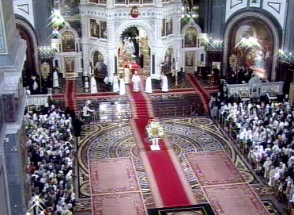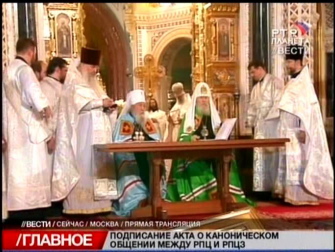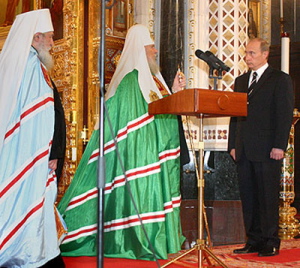
Moscow, May 16 and 17, 2007 — The signing ceremony, held in Moscow’s opulent Christ the Savior Cathedral, is being held on Ascension, the day commemorating Christ’s ascent into heaven. Moscow’s largest cathedral was blown up by Soviet dictator Josef Stalin and rebuilt after the 1991 Soviet collapse.
It brings to an end a bitter division between Russia’s predominant church and the splinter church formed by exiles fleeing the Russian Revolution and the rise of the communist state.
The head of the Russian Orthodox Church, Moscow Patriarch Aleksy II, and Metropolitan Lavr (Laurus), the New York-based leader of the Russian Orthodox Church Abroad, signed an agreement on restoring canonical relations.
Patriarch Aleksy hailed the merger as a symbolic break with the shackles of the past. “We have overcome the division of the churches. We have overcome the legacy of the revolution and civil war from that time, the schism in society,” he said. “The church is being strengthened and our homeland is being restored.”
Russian President Vladimir Putin, speaking at the ceremony, called the unification a “truly national, historic event of tremendous moral significance.”
“The church division occurred as a result of the deepest political split of Russian society following a fierce civil confrontation,” Putin said. “In today’s Russian society, which is based on the democratic principles of religious freedom, there are no more reasons for this outdated tragedy, for this obsolete confrontation.”
Today’s ceremony is a key achievement for the Russian Orthodox Church, which since the Soviet collapse has sought to bring the exile church back into its fold.
The unification is viewed as a step toward strengthening the Russian nation as well as the Orthodox Church. Russian President Vladimir Putin, who attended the ceremony, said restoring the unity of the church is an important step toward “rediscovering the lost unity of the Russian people.”

According to the document signed today, the two churches agree to recognize each other’s religious hierarchies and celebrations. The Church Abroad, however, will accept the Moscow Patriarchate as the ultimate authority. The Moscow Patriarchate will gain the right to approve the nomination of new leaders of the Church Abroad. Parishes of the Church Abroad will also now mention the patriarch’s name during Liturgy.
Background
The reunification is an important step for Russia in coming to terms with its communist past. Founded by clerics who fled the 1917 Bolshevik Revolution, the breakaway Orthodox church was first based in Stavropol, a southern Russian city then controlled by the White Army. As the Red Army advanced, the church moved to Ottoman Turkey, and then to Serbia, before establishing its headquarters in New York.
The Church Abroad severed all ties with Moscow in 1927 after the Moscow Patriarchate signed a declaration of loyalty to the atheist Soviet regime.
Contacts were only officially renewed in 2003, when the Moscow Patriarchate recanted the declaration as a “tragic compromise.”
Not all members of the exiled church, however, welcome the reunification. Some say the Moscow Patriarchate is stained by its Soviet past and condemn its ties with President Vladimir Putin, a former Soviet intelligence officer (see Religioscope report in 2002).
Xenia Dennen, the head of the Keston Institute, a London-based group that studies religious issues in communist and former communist countries, says the reunification is significant. “It will mean a great deal for those who couldn’t receive communion from the Russian Orthodox Church Abroad,” she says. “However, there’s a lot of disagreement within the Russian Orthodox Church Abroad. There are fears that the Moscow Patriarchate’s focus is particularly on power control, on getting its hands on the property of the Russian Orthodox Church Abroad.” Under the new arrangement, the Church Abroad will retain control over its property and continue to appoint its own priests.
Good For Putin’s Image

Both supporters and critics of the reunification agree that the event’s significance extends far beyond religion. “For the regime, this is of course a big advertisement project,” says Mark Smirnov, editor in chief of the religion magazine of the Russian daily Nezavisimaya Gazeta. “Because it enables Putin to show that during his tenure as president he was not only a rather successful manager, but also the one who united the churches. One can see it as a historic step that will figure in large print in Vladimir Putin’s biography.”
Dennen of the Keston Institute views the reunification as part of a broader Kremlin campaign to buff up Russia’s image.”Of course the Orthodox Church is very grand and very beautiful, and that [reunification] will contribute to that image,” she says. “I think, although legally it isn’t the established church, it in fact it behaves as though it were, and Putin’s regime certainly makes good use of that.”
Putin has strongly supported the reconciliation between the two churches, as well as other steps to revive Russia’s pre revolutionary past. While some have welcomed his efforts, others have accused him of stirring nationalist feelings.
The Russian Orthodox Church in 2000 canonized Russia’s last tsar, Nikolai II, and his family, who were murdered by the Bolsheviks. Last year, the remains of the tsar’s mother, Empress Maria Fyodorovna, who died in exile in Denmark, were reburied in St. Petersburg.
© 2007. RFE/RL, Inc. Reprinted with the permission of Radio Free Europe/Radio Liberty, 1201 Connecticut Ave., N.W. Washington DC 20036.
Website: http://www.rferl.org/
Documents
Act of Canonical Communion
We, the humble Alexy II, by God’s mercy Patriarch of Moscow and All Russia, jointly with the Eminent Members of the Holy Synod of the Russian Orthodox Church of the Moscow Patriarchate […]; and the humble Laurus, Metropolitan of Eastern America and New York, First Hierarch of the Russian Orthodox Church Outside of Russia, jointly with the Eminent Bishops, members of the Synod of Bishops of the Russian Orthodox Church Outside of Russia […];
Being guided by the effort towards reestablishing blessed peace, Divinely-decreed love, and brotherly unity in the common work in the harvest-fields of God within the Fullness of the Russian Orthodox Church and her faithful in the Fatherland and abroad, taking into consideration the ecclesiastical life of the Russian diaspora outside the canonical borders of the Moscow Patriarchate, as dictated by history;
Taking into account that the Russian Orthodox Church Outside of Russia performs its service on the territories of many nations;
By this Act declare:
1. That the Russian Orthodox Church Outside of Russia, conducting its salvific service in the dioceses, parishes, monasteries, brotherhoods, and other ecclesiastical bodies that were formed through history, remains an indissoluble, self-governing part of the Local Russian Orthodox Church.
2. That the Russian Orthodox Church Outside of Russia is independent in pastoral, educational, administrative, management, property, and civil matters, existing at the same time in canonical unity with the Fullness of the Russian Orthodox Church.
3. The supreme ecclesiastical, legislative, administrative, judicial and controlling authority in the Russian Orthodox Church Outside of Russia is her Council of Bishops, convened by her Primate (First Hierarch), in accordance with the Regulations [Polozheniye] of the Russian Orthodox Church Outside of Russia.
4. The First Hierarch of the Russian Orthodox Church Outside of Russia is elected by her Council of Bishops. This election is confirmed, in accordance with the norms of Canon Law, by the Patriarch of Moscow and All Russia and the Holy Synod of the Russian Orthodox Church.
5. The name of the Primate of the Russian Orthodox Church and the name of the First Hierarch of the Russian Orthodox Church Outside of Russia are commemorated during divine services in all churches of the Russian Orthodox Church Outside of Russia before the name of the ruling bishop in the prescribed order.
6. Decisions on the establishment or liquidation of dioceses of the Russian Orthodox Church Outside of Russia are made by her Council of Bishops in agreement with the Patriarch of Moscow and All Russia and the Holy Synod of the Russian Orthodox Church.
7. The bishops of the Russian Orthodox Church Outside of Russia are elected by her Council of Bishops or, in cases foreseen by the Regulations of the Russian Orthodox Church Outside of Russia, by the Synod of Bishops. Such elections are confirmed in accordance with canonical norms by the Patriarch of Moscow and All Russia and the Holy Synod of the Russian Orthodox Church.
8. The bishops of the Russian Orthodox Church Outside of Russia are members of the Local Council [Pomestny Sobor] and Council of Bishops [Arkhiereiskij Sobor] of the Russian Orthodox Church and also participate in the meetings of the Holy Synod in the prescribed order. Representatives of the clergy and laity of the Russian Orthodox Church Outside of Russia participate in the Local Council of the Russian Orthodox Church in the established manner.
9. The supreme instances of ecclesiastical authority for the Russian Orthodox Church Outside of Russia are the Local Council and the Council of Bishops of the Russian Orthodox Church.
10. Decisions of the Holy Synod of the Russian Orthodox Church extend to the Russian Orthodox Church Outside of Russia with consideration of the particularities described by the present Act, by the Regulations of the Russian Orthodox Church Outside of Russia and by the legislation of the nations in which she performs her ministry.
11. Appeals on decisions of the supreme ecclesiastical court of the Russian Orthodox Church Outside of Russia are directed to the Patriarch of Moscow and All Russia.
12. Amendments to the Regulations of the Russian Orthodox Church Outside of Russia by her supreme legislative authority are subject to the confirmation of the Patriarch of Moscow and All Russia and the Holy Synod of the Russian Orthodox Church in such case as these changes bear a canonical character.
13. The Russian Orthodox Church Outside of Russia receives her holy myrrh from the Patriarch of Moscow and All Russia.
By this Act, canonical communion within the Local Russian Orthodox Church is hereby restored.
Acts issued previously which preclude the fullness of canonical communion are hereby deemed invalid or obsolete.
The reestablishment of canonical communion will serve, God willing, towards the strengthening of the unity of the Church of Christ, of her witness in the contemporary world, promoting the fulfillment of the will of the Lord to “gather together in one the children of God that were scattered abroad” (John 11:52).
Let us bring thanks to All-Merciful God, Who through His omnipotent hand directed us to the path of healing the wounds of division and led us to the desired unity of the Russian Church in the homeland and abroad, to the glory of His Holy Name and to the good of His Holy Church and Her faithful flock. Through the prayers of the Holy New Martyrs and Confessors of Russia, may the Lord grant His blessing to the One Russian Church and Her flock both in the fatherland and in the diaspora.
Addendum to the Act of Canonical Communion
The Act of Canonical Communion goes into effect upon its confirmation by the Holy Synod of the Russian Orthodox Church, on the basis of the decision of the Holy Council of Bishops of the Russian Orthodox Church “On the Relationship with the Russian Orthodox Church Outside of Russia” (Moscow, October 3-8, 2004); and by decision of the Synod of Bishops of the Russian Orthodox Church Outside of Russia, on the basis of the resolution “Regarding the Act on Canonical Communion” of the Council of Bishops of the Russian Orthodox Church Outside of Russia (San Francisco, May 15-19, 2006).
1. In accordance with the Act on Canonical Communion, certain addenda and amendments are to be made to Chapter 8 of the Regulations [Ustav] of the Russian Orthodox Church (“Self-governing Churches”) and to the Regulations [Polozhenie] of the Russian Orthodox Church Outside of Russia.
2. Acting in the spirit of ecclesiastical oikonomia, the Holy Synod of the Russian Orthodox Church and the Synod of Bishops of the Russian Orthodox Church Outside of Russia envision a five-year transition period for the full regularization of the status of former parishes of the Russian Church Abroad on the canonical territory of the Moscow Patriarchate, through their entering into the jurisdiction of the local ruling bishops. Before this period elapses, such parishes which are not on the territory of Self-governing Churches have the opportunity to be under the protection of a Vicar to the Patriarch of Moscow and All Russia, who, with the blessing of the Patriarch, may participate in the work of the Council of Bishops and Synod of Bishops of the Russian Orthodox Church Outside of Russia by invitation of her First Hierarch.
3. In the countries of the diaspora where parallel church structures exist, including the Holy Land, both sides will, with proper pastoral discretion, apply every effort to resolve problems hindering successful cooperation and joint witness.